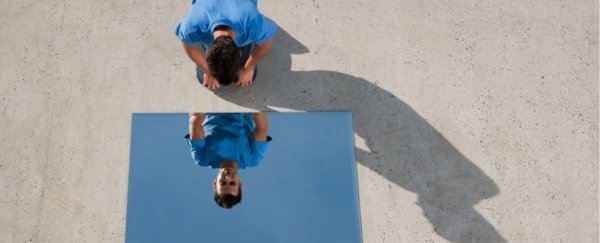Sometimes even those with narcissistic tendencies don't like looking in the mirror. New research has found that people who excessively approve of themselves are unwilling to reflect on their mistakes.
When something unforeseen and unfortunate happens, a narcissist appears less inclined to ask, "What could I have done differently?" and more inclined to throw up their hands and cry, "No one could have seen this coming!"
At first, this might sound like a humble statement for a narcissist. It's certainly more modest than claiming you knew it all along (a concept known as hindsight bias).
But when someone's predictions have been clearly proved wrong, the researchers behind the latest study suggest narcissists go into self-protection mode and start blaming it on the unpredictability of the universe.
"We argue that, due to their exaggerated self-enhancement and self-protection tendencies, narcissists show stronger hindsight bias when their predictions are accurate and a reverse hindsight bias when their predictions are inaccurate, both of which harm their learning and future decision making," the authors of the new study argue.
Conducting four variations on the same hiring experiment, researchers tested the various levels of narcissism present among students, employees, and managers, and looked at how that might play out in the workplace.
To do this, volunteers were asked in an online survey whether they identified more with statements like "I think I am a special person" than statements like "I am no better or worse than most people."
Shortly after this quiz, applicants were offered an opportunity to sign up for another in-person study. To avoid influencing expectations, the researchers took efforts to keep the participants unaware that the questionnaire was connected to the follow-up study.
This more personal half of the study involved groups being asked to read a bunch of qualifications for a hypothetical job and choose who to hire. They were then given their pick's performance assessment and asked whether they made the right decision.
Subtle variations in the methodology and performance outcomes of all four experiments allowed researchers to analyse how narcissism can impact hindsight bias and our ability to reflect on what we should have done, known as 'should counterfactual thinking'.
In the end, the authors found those who scored high for narcissism were less likely to admit they should have done something different in hindsight, even when their predictions were inaccurate.
The authors aren't sure why this is the case, but they say the study suggests narcissists are "especially prone to blindly feel like winners after success". Whereas after failure, they do not engage with their mistakes.
Many people have called Donald Trump a narcissist for showcasing both of these characteristics, the authors point out - for example, when he claimed to predict the outcomes of the Iraq war "better than anybody", versus when he said "Nobody knew health care could be so complicated" after failing to make a health care deal.
This is sometimes called the 'failure-to-ask-why syndrome', and when the answer is a fault of our own, it can seriously impede our ability to take responsibility and learn from our mistakes.
The authors use the financial crisis that began in 2007 as an example of just that.
"Despite many Wall Street bankers claiming the financial crisis was impossible to predict, the Financial Crisis Inquiry Commission concluded that the crisis was in fact foreseeable and avoidable," they write.
"Thus, perceiving an inaccurately predicted outcome as unforeseeable implies an external attribution; as such, lessons are not learned and the decision-making process remains unchanged."
After all, it's hard to improve if there's nothing deemed wrong in the first place. In fact, this defensive behaviour could be why some studies have found narcissists are generally happier and less stressed out than their peers.
Who needs to worry when you're not to blame for anything that goes wrong?
The study was published in Management.
